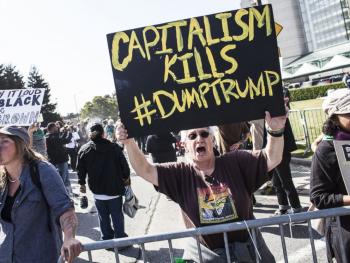I know I am not alone shedding tears for the story of the 2016 American election. These aren't the tears of a campaign or game lost, or an ego wounded, nor are they tears of aloneness, because I know I am not the only one who is afraid.
These tears connect me to all of those who are afraid. We are connected because the politics of hatred and fear are less visible but alive in Canada too, because the fear of discrimination and violence is shared by women and so many minority groups in America, because those who voted for Trump are afraid too. There is fear all around us.
On some level, I know that there is beauty and possibility in a shared sentiment. Here in our fear and despair, we can, in theory, find common ground for action. Resilient people will write about it and call us to action.
The only thing that we have in common as people is that we will experience suffering, pain and loss. We may differ in how we are able to deal with suffering, but even then, we are all doing the best we can. We are together struggling against a neoliberal economy that tries to insulate us from a universal human condition -- and is failing to do so. More wealth and power is concentrated in the hands of the few, it is making them no happier, and more and more people are unable to meet their basic needs. As James Orbinski said to the Canadian Medical Association this summer speaking about climate change: When you can't feed your children, you will do anything to feed your children -- you will go to war.
America, and its closest neoliberal brothers like Canada, are suffering deeply and coping with an addiction to violent colonialism, destructive consumption, and greed: people are self-medicating with money and power. They are destroying themselves, their society, and the planet in the process of just getting by.
The enculturation of fear and hatred helps people avoid confronting suffering with a veil of illusory self-protection. This offers a sense of false togetherness through anger and rejection of the other, and it is self-destructive because healing cannot happen through isolation, only connection. But is an appealing veil. And society is suffering deeply beneath it.
I live in the Downtown Eastside of Vancouver, and see a common story with those whose suffering is so great that heroin or meth are the only options. When suffering is great, a person feels that there is no real choice. And yet there is community here, in this suffering. Perhaps we all aren't so different.
America's blind vote for power and destruction is a failed and harmful coping mechanism, like addiction. Democracy has served sexism, racism and hatred. Yes, that's just how messed up addiction is. We have to look at the suffering beneath when, like a patient, a society no longer knows how to look after itself and its people.
In the vulnerable shadow of this election I hope we can grieve the perpetuation of hatred and greed through politics, and the resultant harm we and the planet will feel. Often, we hit rock bottom and see our addiction with clearer eyes, and then we can change.
Last week Amnesty International released a report describing the violence against land and people in Northeastern B.C. The political and cultural machine is serving us as poorly in Canada in this context, as it has in America in this election. I hope that this election result can motivate a good, hard look at the social, cultural, and political perpetrators of fear and violence in our own province, for the story of the oppressors and the oppressed are familiar on both sides of the border.
Creating space for grief can create space for community, for healing, and for movement towards something different. Let us remember the suffering beneath the addiction, build our capacity to bear witness to it, and look after one another.
This piece originally appeared on the B.C. CCPA's PolicyNote blog.
Image: Getty Images/Ramin Talaie




Comments
Do
Don't